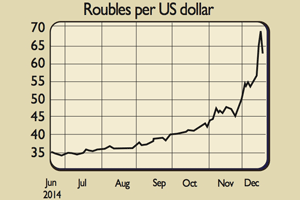Rout in the Russian rouble
The Central Bank of Russia has been forced to intervene to prop up the collapsing currency.

Get the latest financial news, insights and expert analysis from our award-winning MoneyWeek team, to help you understand what really matters when it comes to your finances.
You are now subscribed
Your newsletter sign-up was successful
Want to add more newsletters?

Twice daily
MoneyWeek
Get the latest financial news, insights and expert analysis from our award-winning MoneyWeek team, to help you understand what really matters when it comes to your finances.

Four times a week
Look After My Bills
Sign up to our free money-saving newsletter, filled with the latest news and expert advice to help you find the best tips and deals for managing your bills. Start saving today!
"Even by the standards of emerging market currency meltdowns, the rouble's gyrations have been extreme," said the Financial Times. Less than a fortnight ago, 52 roubles were needed to buy a US dollar; by last Tuesday you needed 70-80, despite a huge 6.5% overnight interest-rate hike by the central bank to stop capital flooding out of Russia.
It bounced back on Wednesday as the Russian central bank outlined plans to help ease pressure on the banking system, although the rouble remained above the 60 mark.
What the commentators said
Higher interest rates designed to stop capital flight are simply squeezing the economy, while the jump in inflation, already at 9%, is eroding real incomes. As the currency rout intensifies, "a lethal combination of deep recession and runaway inflation" becomes more likely, said The Economist.
MoneyWeek
Subscribe to MoneyWeek today and get your first six magazine issues absolutely FREE

Sign up to Money Morning
Don't miss the latest investment and personal finances news, market analysis, plus money-saving tips with our free twice-daily newsletter
Don't miss the latest investment and personal finances news, market analysis, plus money-saving tips with our free twice-daily newsletter
A key problem is Russia's external debt of around $614bn, and it is becoming increasingly hard to borrow abroad thanks to the sanctions.

Russia could impose capital controls. But this would be "a deeply unpopular and retrograde step" for a government that worked so hard to boost confidence in the rouble in the 2000s, said the FT. Only a loosening of Western sanctions or sharply higher oil prices, said Pierre Briancon on breakingviews.com, can stem the tide now.
Get the latest financial news, insights and expert analysis from our award-winning MoneyWeek team, to help you understand what really matters when it comes to your finances.

-
 How to navigate the inheritance tax paperwork maze in nine clear steps
How to navigate the inheritance tax paperwork maze in nine clear stepsFamilies who cope best with inheritance tax (IHT) paperwork are those who plan ahead, say experts. We look at all documents you need to gather, regardless of whether you have an IHT bill to pay.
-
 Should you get financial advice when organising care for an elderly relative?
Should you get financial advice when organising care for an elderly relative?A tiny proportion of over 45s get help planning elderly relatives’ care – but is financial advice worth the cost?